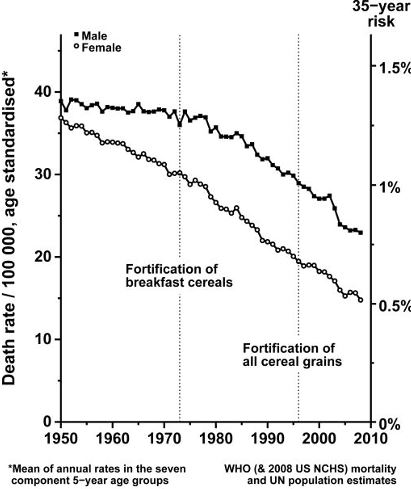Posted April 23, 2015: by Bill Sardi
News headlines say a new study reveals high-dose vitamins, in particular folic acid, may increase the risk for cancer. [ABC News April 20, 2015; Science Daily April 20, 2015] But wait. There was no new study. It was just Tim Byers, an MD at the University of Colorado Cancer Center mouthing off once again against vitamin supplements in a forum at the American Association for Cancer Research. [Colorado Cancer Blogs]
Dr. Byers has been on this vendetta against dietary supplements for some time now. [Journal National Cancer Institute May 16, 2012]
Dr. Byers fails to note the many contrary studies, including the largest analysis among nearly 50,000 individuals that concluded there was no significant increase or decrease in the risk for cancer as blood levels of folic acid rose. [Lancet March 23, 2013] Even 40 milligrams/day of folic acid over a period of 3.2 year did not produce an increased risk for cancer. [Journal American Medical Assn. Sept 12, 2007]
Some of these studies that exonerate folic acid as a cancer-causing vitamin surprisingly included Dr. Byers’ name among the list of co-authors.
For example, Dr. Byers name is on a paper published in 2013 that said: “there was no overall association with breast cancer at the highest folic acid intake.” In fact, the report concluded: “Higher intake of folic acid is marginally associated with a lower risk for estrogen receptor negative breast cancer.” [PLoS One 2013]
In 2008 Dr. Byers named was also listed among investigators who published a paper that said: “Our findings support the idea that moderate doses of folic acid may be protective compared with deficiency, while at some point of sufficiency, supplementation provides no additional benefit.” [Cancer Epidemiology Biomarkers Prevention Oct 2008]
Even if high-dose folic acid does increase the incidence and growth of cancer there is no way living cells are healthy without folic acid. It is clearly documented that without folic acid genes and chromosomes are unstable. [Advances Nutrition Jan 2012] Without folic acid cells become cancerous.
For example, women who are deficient in folic acid run up to a 330% increased risk for cervical pre-cancer. [Nutrition Cancer 1992] Folic acid supplementation normalizes abnormalities on a Pap smear. [American Journal Clinical Nutrition Jan 1982]
The following chart displays the colon-rectal cancer mortality rate over a 58-year period with notations when folic acid supplementation began in breakfast cereals and then all cereal grains. Does it appear to you that folic acid poses a cancer threat?

Colorectal cancer mortality trends, 1950–2008, in the United States at ages 35–69
The alleged association between cancer incidence, cancer growth and cancer mortality is that cancer patients tend to take vitamin supplements more so than healthy patients. For example in one study 14% of cancer treatment survivors initiated dietary supplement use after their diagnosis. [British Journal Nutrition March 31, 2015] This can make it appear there is a false increased association between vitamin supplements and cancer.
Don’t run back to your oncologist to ask him or her whether folic acid supplementation poses a risk for cancer. One would think physicians would be prepared to answer patient questions about dietary supplement use. After all, more than 50% of Americans take dietary supplements and up to 70% of cancer patients. [Integrative Cancer Therapy Jan 2015] In one survey two of three oncologists conceded they were ignorant on how to advise patients taking dietary supplements. [Journal Clinical Oncology Dec 2014] –©2015 Bill Sardi, Knowledge of Health, Inc.
Posted in Cancer, Dietary Supplements, Vitamins ; No Comments »
11
17
52
95
14
24
237
6
56
43
10
116
15
66
105